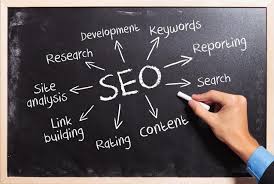SEO and SEM concepts and relevance
On Page Optimization
What is On Page Optimization?
On-page optimization (on-page SEO) is what can be done ON the pages of a website to maximize its performance in the search engines for target keywords related to the on-page content.
On Page Optimization includes various factors of optimization:
1) Content Optimization: In this technique you should concentrate on your user and easy readability.
– Concentrate on your users first
Thats what the website is about as you donot sell your products or services to search engines but to people. And if they donot get what you are saying or find it hard to read through your website they very likely hit the back button of their browser and visit your competition.
– Then modify for search engines
If you got your text together go over it again and try to get some more keywords and phrases in where they fit and make sense. There is no certain amount or percentage that is best, just make sure to just use them a couple of times. The best ways to avoid using them too often are to use different words and phrases and to create some lists. Lists are always good to bring in some keywords.
2) Keyword Selection: The very first step of On page optimization is keyword selection. Always start with keyword selection, research and testing. It depends upon two factors search count and intitle. Always go for the keywords that are having more search count and less intitle.
To check intitle just type: intitle:”keyword” in search engine search box.
Keywords can be searched from the following tools.
3) Title tag: It describes briefly about your web page. Try to include the main keywords of your site in the title. Include 1-2 of your most important keyword phrases here. Ideally, around 8 to 10 words or around 70 to 90 characters including spaces. Like if we have keywords: Website Optimization Tips, Website Optimization Advise then our title should be like this :- Website Optimization Tips | SEO Advice
4) Meta tags: There are three main meta tags which is solely for Search Engines.
Title Tag: Every page should have <TITLE> tags. TITLE tags appear on the status bar above the menu bar in a web browser. It is displayed at the top of your browser and it is also used as the title of your website in the SERPs.
Syntax: <meta name=”title” content=”Website Optimization Tips | SEO Advice”>
Important aspects of the title-tag:
- Give every page of your website its own title and don’t use one title for the whole website.
- It should contain no more than around 10-12 words.
- Think of it as a short ad copy, because that’s basically it when users see them on the SERPs.
- Avoid using articles and conjunctions like a, the, and. Use the pipe(|) or dash (-) to separate keywords.
- Do not “stuff” your title by repeating your keyword phrases over and over. Search engines will ban sites for such practices.
Description Tag: The description-tag is probably the most important META-Tag and is reflective of the content on the page. It is displayed in the SERPs and you should select it as carefully as the title-tag.
Syntax: <meta name=”description” content=”Best website optimization tips and advice.”>
Important aspects of the description-tag:
– Give every page of your website its own description and donot use one description for the whole website.
– The description -tag is one of the few meta-tags that still positively influences your websites ranking, so its good to use your most important keywords in it.
– It should contain not more than around 25-30 words or 250 characters including spaces. Include the main keywords at the beginning of this tag.
– Think of it as a short ad copy, because thats basically it when users see them on the SERPs.
– Include the main keywords at the beginning of this tag.
Keyword Tag: Keyword tag contains the keyword phrases that are also used in the copy of the page, Title tag, Meta description, and other tags. This Meta Tag is less important than the DESCRIPTION Tag. The most of search engines just don’t use it (e.g. Google), but some do. But there is nothing wrong to type there your keywords.
Syntax: <meta name=”keywords” content=”six to ten keywords”>
There is two more meta tags:
Revisit: Use this Meta-Tag to define how often you want a search engine to come back to your Web site. Use the Revisit Meta-tag if you like, but it is not needed.
Robots: This Meta-Tag is used to block search engines from indexing pages. It also can be used to to tell search engines to index a page.
Syntax: <Meta name=”robots” content=”Index, Follow”>
Apply for SEO Certification Now!!
http://www.vskills.in/certification/Certified-SEO-Professional


